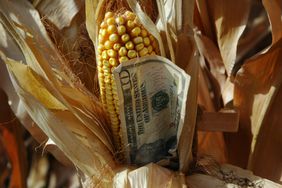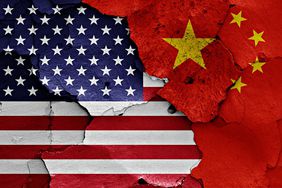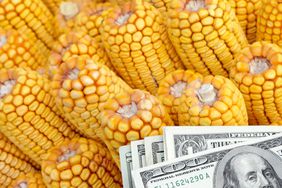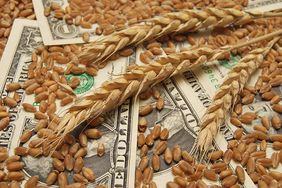:max_bytes(150000):strip_icc()/7019969IgnacioCosta-1848069546_preview-a39d8c41ae604c06a624a5ca3a80d760.jpg)
Ignácio Costa, gt29, Getty Images
This past marketing year, Brazil exported more corn than the U.S. for the first time in history — and it may not be the last time.
Over decades, Brazil has risen as an agricultural production powerhouse and become a stiff competitor for U.S. exports, particularly to China. Experts say this competition is going to persist; finding ways to diversify and grow demand can help.
Brazil’s production surge
According to data from the USDA Foreign Agricultural Service, in 20 years Brazil has nearly tripled corn and soybean production, and exports have exploded by more than 1,000% and 400%, respectively.
“It’s easy to think about [the soybean boom] as a Brazilian story,” says Dr. Guilherme DePaula, a native Brazilian who is assistant professor of economics at Iowa State University. “But if you dig deep, it’s as much a U.S. story as a Brazilian story, because the boom happened when the trading companies jumped in.” Much of DePaula’s research has focused on Brazilian agriculture.
DePaula says investments from companies such as ADM, Bunge, and Cargill were integral to developing soybean and corn crops in Brazil.
“They started financing, commercializing, and transporting high volumes of soybeans from Brazil, mostly to China,” he says.
‘A particularly difficult hurdle’
Between Brazil’s robust production rates, higher U.S. prices, and a strong dollar, the U.S. has increasingly felt the sting of competition in recent years. Joe Foley, commodity trading manager for corn and soybeans at global commodity shipping company Columbia Grain International, says the last three to five years have been particularly tough.
“With what’s going on in Brazil with production right now, we have a particularly difficult hurdle to get over,” he says.
To make matters worse, recently the U.S. hasn’t been able to bank on a longtime advantage it usually has over Brazil: transportation.
Historically, while the U.S. was known for being reliable, Brazil has struggled with infrastructure to get the crop out of the country. But during the past two years, Mississippi River water levels have dropped to record lows, slowing shipments and raising costs. Furthermore, DePaula says, transportation is the latest chapter in the story of Brazilian agriculture and American investment, with progress being made now toward better roads.
:max_bytes(150000):strip_icc()/7019969LuisVeiga-1400180632_preview-caab3c368cd44f70ac9731b677fb4a64.jpg)
Luis Veiga, Getty Images
The great wallet of China
Brazil is China’s largest supplier of soybeans and, for now, its largest corn supplier. Steve Nicholson, global strategist on grains and oilseeds for Missouri-based lender and insurer Rabo AgriFinance, says he expects the U.S. and Brazil to continue to compete for China’s business.
“With the continued deterioration of the U.S.-Chinese relationship, the Chinese have pulled more and more business away from us and moved more and more business to Brazil,” he says. “They’re going to do anything to ‘punish’ the U.S. for their perceived ill treatment. They’re going to go someplace where they feel like they’re loved, wanted, and people want to do business with them.”
Nicholson says the recent U.S.-China trade war has a lot to do with China’s negative feelings.
“I said during the ’17–’18 period, when the tariffs were put on, that this will harm us for a number of years and it will take us a long time to get back the label of being a reliable supplier,” he says. “We’re still dealing with that hangover.”
The good news? Nicholson says China is a pragmatic buyer.
“If we have the cheapest beans, they’re going to come to us,” he says. “They’re very price-sensitive.”
DePaula agrees, saying China wants competition between the U.S. and Brazil to drive prices lower.
Different continents, same struggles
While Brazil has become a major U.S. competitor, it may be surprising to learn Brazilian farmers face many of the same challenges as American growers, such as worrying about getting enough rain, and a good price for their crops.
“Brazilian farmers are struggling with the same price issues as U.S. farmers,” DePaula says. “They have the same struggles with costs, with financing their farms, and with competition.”
DePaula says the central state of Mato Grosso, Brazil’s largest soybean-producing state, is facing prices below the cost of production. He also notes Brazilian farmers are additionally disadvantaged by not having the grain storage capacity U.S. farmers enjoy, limiting farmers’ abilities to hold out for better prices.
The hunt for demand
Unless global demand increases, DePaula says, the supply situation could be lose-lose for both countries.
“You see the U.S. investing in demand- generation programs, and Brazil is doing the same,” he says, adding Brazil is looking to start blending an increased amount of biodiesel with its diesel fuel supply. Biodiesel is a renewable fuel made from fats and vegetable oils, including soybean oil. It is typically blended into diesel fuel at a specific percentage. “That tells you that there is a real limit where the competition becomes unprofitable anymore if you don’t generate this additional demand,” DePaula says.
Nicholson says the U.S. should look to the European Union (EU) as a potential new market because the EU’s concerns about Brazilian deforestation may impede that country’s access. He also suggests farmers look into niche opportunities such as non-GMO or low-carbon crop markets.
“[Yes], they’re going to take more management time and more management resources and energy,” he says. “But if it’s good for the economic vitality and sustainability of the operation, that’s worth looking at.”
:max_bytes(150000):strip_icc()/CassidyWalter_1-web-83717e5b38194dfa9e314356b6d4c1c2.jpg)










